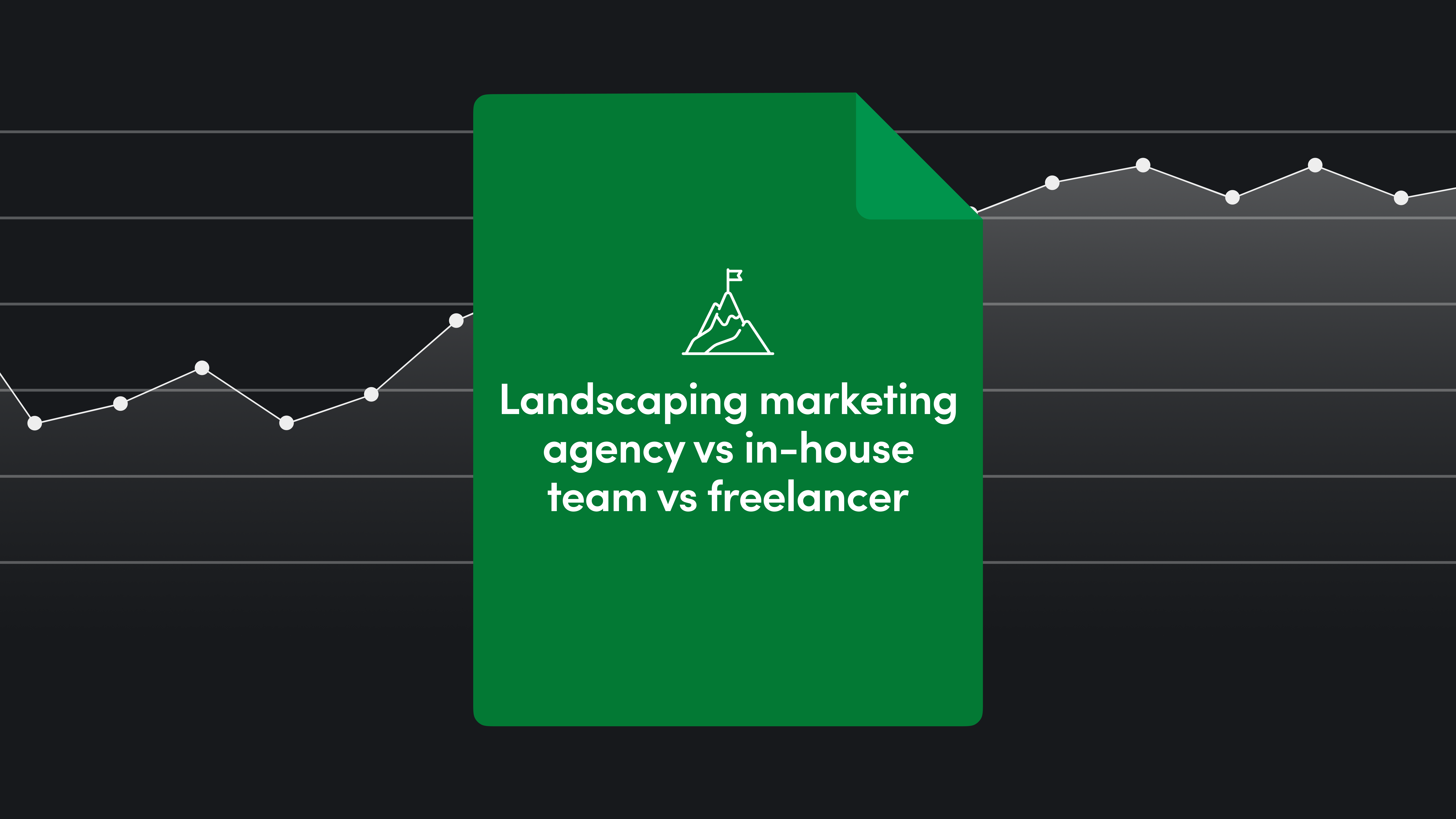Table of Contents
Table of Contents
- What is a landscaping business grant?
- How can landscaping businesses use grants?
- What types of grants should landscaping businesses be aware of?
- How can I apply for landscaping grants?
- Where can I look for landscaping business grants?
- What are the alternatives to grants to fund a landscaping business?
- The bottom line
- Frequently Asked Questions (FAQs)
Landscaping business grants refer to financial assistance provided by government, non-profits, or private organizations to help landscaping businesses with funding.
These grants support business growth, new equipment purchases, or sustainability initiatives without repayment, so they’re a great funding option for landscaping businesses.
When should you get a landscaping business grant?
Landscaping contractors use business grants when they need extra capital to expand services, purchase new equipment, hire more staff, or invest in eco-friendly solutions.
→ Grants are beneficial when loans aren’t an option due to repayment terms or interest rates.
How many different landscaping business grants are there?
There are nine types of small business grants, including those sponsored by federal, state, and local governments, that landscaping contractors can apply for to obtain business financing.
Some grants are for specific groups, like women or minority business owners, while others are for job creation or environmental impact.
Landscaping contractors can apply for a small business grant by following these five steps:
Check eligibility
Research grants
Prepare business documents
Sow the impact of the grant
Apply to the correct entity
In the next section, we’ll go into what a landscaping business grant is that can help your business grow.
What is a landscaping business grant?
A grant is financial assistance given to businesses by government agencies, non-profits, or private organizations without strings attached. It is different from direct loans in that it is awarded based on certain criteria and is intended to help the business achieve specific goals, such as job creation or sustainability.
→ Landscaping business grants are targeted funding for landscaping businesses. These grants help landscaping services providers grow their businesses, purchase new equipment, or go green without taking on additional debt.
Landscaping business grants are competitive, and business owners must meet specific eligibility requirements to qualify. Many grants also require the funds to be used for particular purposes, such as expanding services, improving operations, or contributing to environmental sustainability.
How can landscaping businesses use grants?
Landscaping businesses can use grants to cover expenses that help them grow and improve. Here are some areas in which landscaping businesses can use grant funding:
Grants can cover the cost of new landscaping equipment like lawnmowers, trimmers, and eco-friendly tools.
Businesses can use grant funding to add new services like irrigation or sustainable landscaping solutions.
Grants can be used for marketing campaigns to get new clients and increase brand visibility.
Some grants are for job creation so landscaping businesses can hire more staff and grow their team.
Grants can fund eco-friendly projects like switching to electric equipment or using native plants for environmental conservation.
Grants can provide the working capital to cover business operations and keep the business running.
Landscaping contractors can make the most of grant opportunities by using funds to grow and improve their businesses.
What types of grants should landscaping businesses be aware of?
Here are the types of landscaping business grants to know:
Government grants
Job creation grants
Environment, recycling, and forest service grants
Small business grants
Young entrepreneurs
Improvement grants
New immigrant grants
Female founder grants
Veteran business grants
Let’s look into each of these grants in more detail.
1. Government grants for landscaping businesses
Federal, state, and local agencies provide government grants to support various business activities, including landscaping.
For example, the Small Business Innovation Research (SBIR) Program helps businesses that focus on technological innovations, and the Rural Energy for America Program (REAP) helps sustainable businesses in rural areas.
These grants have strict eligibility requirements and target business needs like:
Sustainability
Job creation
Environmental impact
2. Job creation grants
Local or state governments usually offer job creation grants to encourage businesses to grow their workforce.
Landscaping businesses planning to hire more staff or provide new job opportunities to local communities can apply for these grants. For example, state-level job creation programs offer financial incentives to businesses that contribute to local employment growth.
3. Environment, recycling, and forest service grants
Businesses that go green, recycle, or conserve forests may be eligible for these grants. For example, the USDA Forest Service funds businesses involved in forest management or using environmentally responsible products.
These grants support businesses that align with green initiatives, including using electric landscaping equipment and organic materials.
4. Small business grants
These are general grants open to small businesses, including landscaping businesses. Programs like the FedEx Small Business Grant and NASE Growth Grants provide funding to help companies grow, buy equipment, or fund marketing.
Small business grants are more accessible to new and growing businesses than more specific grants and are backed by a national network of resources and organizations.
5. Young entrepreneur's grants
These grants are for young business owners, usually under 35, who want to start or grow their landscaping business.
Examples include the Youth Business USA (YBUSA) grant and the Halstead Grant, which supports young entrepreneurs in various industries, including landscaping. These programs focus on innovation and the next generation of business leaders.
6. Improvement grants
Improvement grants are for businesses looking to upgrade their operations, such as investing in new landscaping equipment or improving their services.
Local governments or industry associations offer these grants to businesses renovating or looking to become more efficient and capable. For example, state economic development departments offer grants for capital improvements.
7. New immigrant grants
These grants are for immigrants and refugees starting or growing their landscaping business in the US. Programs like the Wilson-Fish Alternative Program and the Microenterprise Development Program offer funding and resources to help new immigrants succeed in business, funding initial startup costs and operational needs.
8. Female founder grants
These grants are for women entrepreneurs in various industries, including landscaping. Examples include the Amber Grant and the Cartier Women’s Initiative, which provide funding for women-led businesses to scale their business.
There are also niche grants like the HerRise Microgrant for women of color and the High Five Grant for Moms, which support mompreneurs in balancing family and business.
9. Veteran business grants
Veteran business grants allow former military personnel to start or grow their business. Programs like the Veteran Entrepreneur Portal and the Second Service Foundation’s MEC offer funding and mentorship to veteran business owners.
These grants help veterans transition into entrepreneurship through funding and resources to start landscaping businesses. In addition to funding, these programs often provide technical assistance to help veteran business owners succeed.
These grants offer landscaping businesses funding options to grow, sustain, and innovate. Whether you’re just starting or looking to scale, knowing what grants are available can be a key to financial success.
How can I apply for landscaping grants?
1. Make sure you qualify
Grants have strict eligibility criteria, including:
The size of your business
Revenue
Location, or
Specific industry focus
For example, some grants are for small companies only, while others are for minority or women-owned businesses.
Check with the grant provider to see if your business meets their requirements, usually posted on the grant’s website or through resources like:
✔ Grants.gov, where you can filter opportunities by eligibility criteria
✔ Small Business Development Centers (SBDCs)
✔ Industry-specific grant programs like the U.S. Small Business Administration (SBA)
Once you’ve confirmed you qualify, the next step is to research grants.
2. Research grants for your business
There are federal, state, and local grants, as well as those offered by private organizations and non-profits. Start by searching databases like Grants.gov or GrantWatch, which list funding opportunities from multiple sources.
For more local opportunities, state economic development agencies and local chambers of commerce offer grants to small businesses.
You can also search for industry-specific grants, like environmental or job creation grants.
→ If your landscaping business is eco-friendly or uses sustainable methods, you can apply for grants through the USDA’s Rural Energy for America Program (REAP) or the EPA. These programs often fund businesses focusing on green initiatives like recycling or reducing environmental impact.
Your first step is to explore what’s available:
Visit federal databases and platforms where you can search by grant category, eligibility, and other criteria that may fit your landscaping business.
Explore private organizations and non-profit resources.
Consider corporate grants from large companies that want to support small business growth.
Research specialized “green” grants for landscaping businesses focus on environmental or sustainable practices.
Websites like GrantWatch and GrantFinder are great tools that aggregate thousands of grant opportunities. These platforms allow you to filter by industry to find landscaping grants.
Stay organized as you research.
List all the grants you find and note the following:
Deadlines
Eligibility requirements
Documentation needed
Since each grant application process is different, it’s critical to be prepared and know the timeline and expectations for each one.
→ Always verify the grants you’re applying for. Scammers target business owners with fake grant opportunities. To avoid scams, stick to trusted resources like Grants.gov, government websites, or well-known non-profit organizations.
3. Prepare your business information
Before you apply, you’ll need to have your business information ready, including your:
Business plan
Financial statements
Tax returns and revenue projections
Many grants require a detailed breakdown of your business and how the grant funds will be used.
Your business plan should outline:
✔ Your goals
✔ The services you offer
✔ How the grant will help you achieve specific business outcomes, like buying new landscaping equipment or hiring additional staff
✔ Ensure all legal documents, including business certifications or licenses, are current
Collecting financial data like your balance sheet, profit and loss statement, and cash flow statement will show that your business is financially stable and can manage the grant.
4. Demonstrate how the grant will help you
Grant applications often require explaining how you will use the funds to grow or sustain your landscaping business. Your application must create a case for why you need the grant and how it will impact your business directly.
Outline the specific projects or expenses the grant will cover, such as:
Buying eco-friendly mowers
Expanding your team
Launching a marketing campaign
Be detailed.
Instead of saying, “I will use the funds to buy equipment,” say, “The funds will be used to purchase two electric lawnmowers to reduce our carbon footprint and meet customer demand for eco-friendly services.” If the grant is for jobs, specify how many positions you will create and how they will contribute to your business growth.
5. Submit your application
Most grants have an online application portal, such as Grants.gov, where applicants can upload documents and track their application status.
Always read the instructions carefully; you only need one requirement to disqualify you.
Watch the deadlines and try to apply well in advance in case there’s an issue with the application process.
→ After you apply, follow up with the grantor to confirm they received your application and the timeline for approval.
You can also apply for multiple grants to increase your funding chances. Some grants allow you to apply for others simultaneously; others don’t, so always check the grant conditions.
Where can I look for landscaping business grants?
Finding the right grants for your landscaping business means researching various reputable sources. Below are some places where you can find grant opportunities that fit your business needs:
EDA Resources: Grants to help small businesses grow and thrive
Grants.gov: The primary federal resource for finding and applying for government grants
GrantWatch: Grant listings from government and private sources
SBIR Solicitation Listing: Opportunities for small businesses focused on innovation and research
What are the alternatives to grants to fund a landscaping business?
While grants are great to fund your landscaping business, other options exist. Some alternatives to business grants that landscaping businesses should be aware of include:
Personal funds
Investing in your business with personal savings gives you complete control without taking on debt or giving up equity. But it’s also a personal financial risk.
Crowdfunding
Platforms like Kickstarter or GoFundMe allow businesses to raise money from individuals. If you have a good story or project that resonates with potential backers, this can be an excellent way to raise capital.
Small business loans
Loans from banks, credit unions, or the Small Business Administration (SBA) are a common way to fund landscaping businesses. These loans require repayment with interest but can give you more money for equipment or expansion.
Business credit cards
A credit card gives you quick access to funds, especially for short-term expenses like supplies or marketing. However, high interest rates can be a downside if you don’t pay off the balance quickly.
Angel investors
Lenders provide capital in exchange for equity in the business. Although you may lose some control, angel investors can provide financial support and expertise.
Disaster relief loans
These loans provide financial assistance to businesses affected by declared disasters to help them recover and rebuild.
Grants are just one source of capital for starting or scaling a landscaping business. Consider your long and short-term goals and current financial situation before pursuing the above alternatives.
The bottom line
Grants for your landscaping business can grow whether you want to upgrade equipment, expand services, or hire more staff. There are many grant options, but it just takes time to find the ideal opportunities where you meet the qualifications and application requirements.
With the right business management software, you can streamline processes and increase efficiency within your existing operations to unlock new revenue.
Book a free demo with Aspire to discover how our software can help you access new capital within your organization to grow your landscaping business.
Disclaimer: This article is for general information, not financial or legal advice. Always consult a professional for advice specific to your situation.
Frequently Asked Questions (FAQs)
How do business grants differ from loans?
Business grants differ from loans because grants are non-repayable funds given to businesses meeting specific criteria. Businesses must repay loans with interest over time.
Grants have conditions on how businesses can spend the money, but they don’t increase the business’s debt.
Are small business grants taxable?
Yes, small business grants are generally taxable at the federal and state levels unless specific exemptions exist. Consult a tax professional to know the tax implications of any grant you receive for your business.
How can I know if a grant is legitimate?
Legitimate grants don’t require upfront fees and are processed through reputable organizations, such as government websites or well-known private entities. Be cautious of any grant that requires a fee or seems too good to be true, and research the grant provider thoroughly.
Can I apply for grants online?
Yes, many grants have an online application. Websites like Grants.gov and other official sources allow you to apply online. Always check you’re using the actual website and resources when applying for grants to avoid scams.









